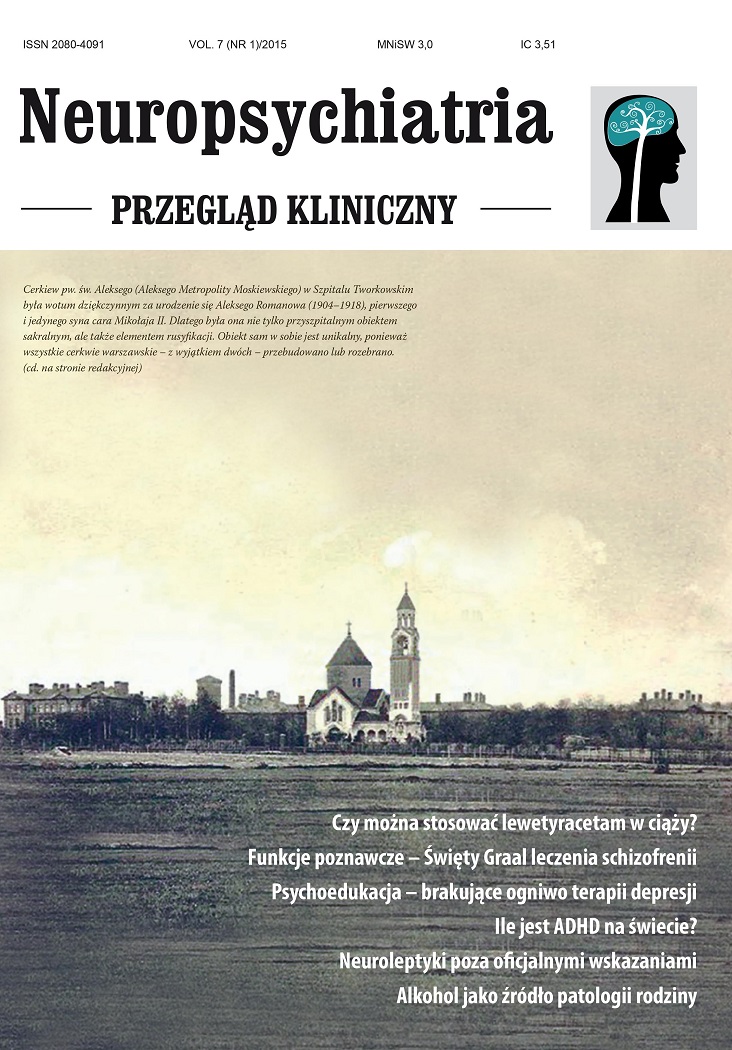Pozarejestracyjne zastosowania neuroleptyków Artykuł przeglądowy
##plugins.themes.bootstrap3.article.main##
Abstrakt
Pozarejestracyjne stosowanie neuroleptyków jest legalną praktyką, w ramach której zapisuje się te środki we wskazaniach innych niż zarejestrowane, w innym wieku, w innej formie, z innym sposobem podawania lub z innymi odstępstwami w stosunku do charakterystyki produktu. Neuroleptyki są powszechnie stosowane w pozarejestracyjnych wskazaniach, np. w zespołach depresyjnych (zaburzeniu jednobiegunowym), lęku, bezsenności, agresji, agitacji, zaburzeniach destrukcyjnych, osobowości pogranicznej, uzależnieniu od alkoholu lub innych substancji, w behawioralnych i psychologicznych objawach związanych z otępieniem oraz w wielu innych zaburzeniach. Zastosowania pozarejestracyjne neuroleptyków są częste, dotyczą nawet połowy ogółu terapii.
##plugins.themes.bootstrap3.article.details##

Utwór dostępny jest na licencji Creative Commons Uznanie autorstwa – Użycie niekomercyjne – Bez utworów zależnych 4.0 Międzynarodowe.
Copyright: © Medical Education sp. z o.o. License allowing third parties to copy and redistribute the material in any medium or format and to remix, transform, and build upon the material, provided the original work is properly cited and states its license.
Address reprint requests to: Medical Education, Marcin Kuźma (marcin.kuzma@mededu.pl)
Bibliografia
2. Leslie DL, Rosenheck R. Off-label use of antipsychotic medications in medicaid. Am J Manag Care 2012; 18: 109-117.
3. Rosenheck R, Leslie D, Sernyak M. From clinical trials to real-world practice: use of atypical antipsychotic medication nationally in the Department of Veterans Affairs. Med Care 2001; 39: 302-308.
4. Rowe DL. Off-label prescription of quetiapine in psychiatric disorders. Expert Rev Neurother 2007; 7: 841-852.
5. Mark TL. For what diagnoses are psychotropic medications being prescribed?: a nationally representative survey of physicians. CNS Drugs 2010; 24: 319-326.
6. Chen H, Reeves JH, Fincham JE et al. Off-label use of antidepressant, anticonvulsant, and antipsychotic medications among Georgia medicaid enrollees in 2001. J Clin Psychiatry 2006; 67: 972-982.
7. Huybrechts KF, Rothman KJ, Silliman RA et al. Risk of death and hospital admission for major medical events after initiation of psychotropic medications in older adults admitted to nursing homes. CMAJ 2011; 183(7): 411-419.
8. Comer JS, Mojtabai R, Olfson M. National trends in the antipsychotic treatment of psychiatric outpatients with anxiety disorders. Am J Psychiatry 2011; 168: 1057-1065.
9. Zanarini MC, Schulz SC, Detke HC et al. A dose comparison of olanzapine for the treatment of borderline personality disorder: a 12-week randomized, double-blind, placebo-controlled study. J Clin Psychiatry 2011; 72(10): 1353-1362.
10. Maglione M, Maher AR, Hu J et al. Off-label use of atypical antipsychotics: an update. Comparative effectiveness reviews, No. 43. Agency for Healthcare Research and Quality, Rockville (MD) 2011.
11. Walton SM, Schumack GT, Ky-Van L et al. Developing evidence- based research priorities for off-label drug use. Agency for Healthcare Research and Quality, Rockville (MD) 2009.
12. Bauer M, Pretorius H, Earley W et al. Results from a phase III study of extended release quetiapine fumarate (quetiapine XR) as add-on to antidepressants in patients with major depressive disorder (MDD). International Forum on Mood and Anxiety Disorders, Budapeszt, Węgry, 5-7 grudnia 2007.
13. Montgomery S, Cutler A, Lazarus A et al. A randomised, placebo- controlled study of once-daily extended release quetiapine fumarate (quetiapine XR) monotherapy in patients with major depressive disorder (MDD). International Forum on Mood and Anxiety Disorders, Budapeszt, Węgry, 5-7 grudnia 2007.
14. Katzman MA, Brawman-Mintzer O, Reyes EB et al. Extended release quetiapine fumarate (quetiapine XR) monotherapy as maintenance treatment for generalized anxiety disorder: a long-term, randomized, placebo-controlled trial. Int Clin Psychopharmacol 2011; 26(1): 11-24.
15. Khan A, Joyce M, Atkinson S et al. A randomized, double-blind study of once-daily extended release quetiapine fumarate (quetiapine XR) monotherapy in patients with generalized anxiety disorder. J Clin Psychopharmacol 2011; 31(4): 418-428.
16. Schutte-Rodin S, Broch L, Buysse D et al. Clinical guideline for the evaluation and management of chronic insomnia in adults. J Clin Sleep Med 2008; 4(5): 487-504.
17. Coe HV, Hong IS. Safety of low doses of quetiapine when used for insomnia. Ann Pharmacother 2012; 46(5): 718-722.
18. Gedge L, Lazowski L, Murray D et al. Effects of quetiapine on sleep architecture in patients with unipolar or bipolar depression. Neuropsychiatr Dis Treat 2010; 6: 501-508.
19. Baune BT, Caliskan S, Todder D. Effects of adjunctive antidepressant therapy with quetiapine on clinical outcome, quality of sleep and daytime motor activity in patients with treatment-resistant depression. Hum Psychopharmacol 2007; 22(1): 1-9.
20. Mukaddes NM, Abali O. Quetiapine treatment of children and adolescents with Tourette’s disorder. J Ch Adol Psychopharm 2003; 13(3): 295-299.
21. Van den Eynde F, De Saedeleer S, Naudts K et al. Quetiapine treatment and improved cognitive functioning in borderline personality disorder. Hum Psychopharmacol 2009; 24(8): 646-649.
22. Van den Eynde F, Senturk V, Naudts K et al. Efficacy of quetiapine for impulsivity and affective symptoms in borderline personality disorder. J Clin Psychopharmacol 2008; 28(2): 147-155.
23. Adityanjee, Romine A, Brown E et al. Quetiapine in patients with borderline personality disorder: an open-label trial. Ann Clin Psychiatry 2008; 20(4): 219-226.
24. Perrella C, Carrus D, Costa E, Schifano F. Quetiapine for the treatment of borderline personality disorder; an open-label study. Prog Neuropsychopharmacol Biol Psychiatry 2007; 31(1): 158-163.
25. Roepke S, Merkl A, Dams A et al. Preliminary evidence of improvement of depressive symptoms but not impulsivity in cluster B personality disorder patients treated with quetiapine: an open label trial. Pharmacopsychiatry 2008; 41(5): 176-181.
26. Stedman M, Pettinati HM, Brown ES et al. A double-blind, placebo-controlled study with quetiapine as adjunct therapy with lithium or divalproex in bipolar I patients with coexisting alcohol dependence. Alcohol Clin Exp Res 2010; 34(10): 1822-1831.
27. Litten RZ, Fertig JB, Falk DE et al. A double-blind, placebo-controlled trial to assess the efficacy of quetiapine fumarate XR in very heavy-drinking alcohol-dependent patients. Alcohol Clin Exp Res 2012; 36(3): 406-416.
28. Cooper ZD, Foltin RW, Hart CL et al. A human laboratory study investigating the effects of quetiapine on marijuana withdrawal and relapse in daily marijuana smokers. Addict Biol 2013 Nov; 18(6): 993-1002. http://doi.org/10.1111/j.1369-1600.2012.00461.x.
29. Kampman KM, Pettinati HM, Lynch KG et al. A double-blind, placebo-controlled pilot trial of quetiapine for the treatment of Type A and Type B alcoholism. J Clin Psychopharmacol 2007; 27(4): 344-351.

